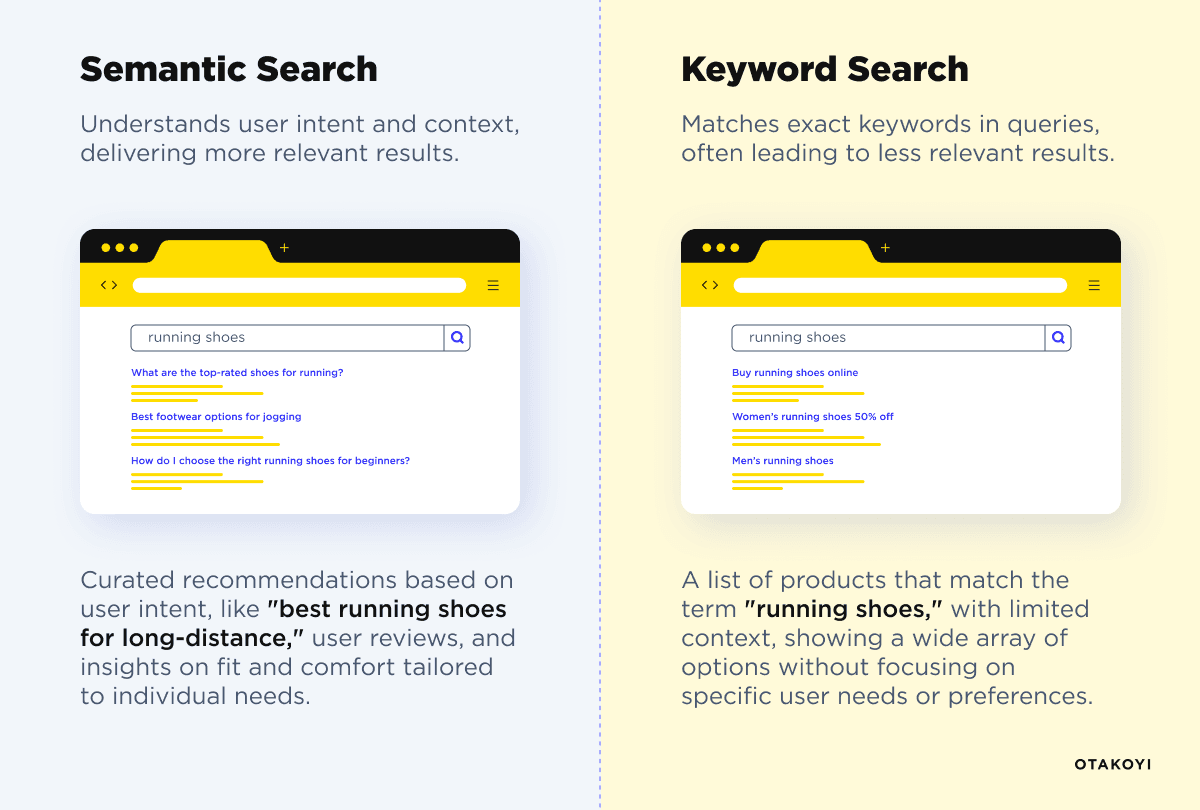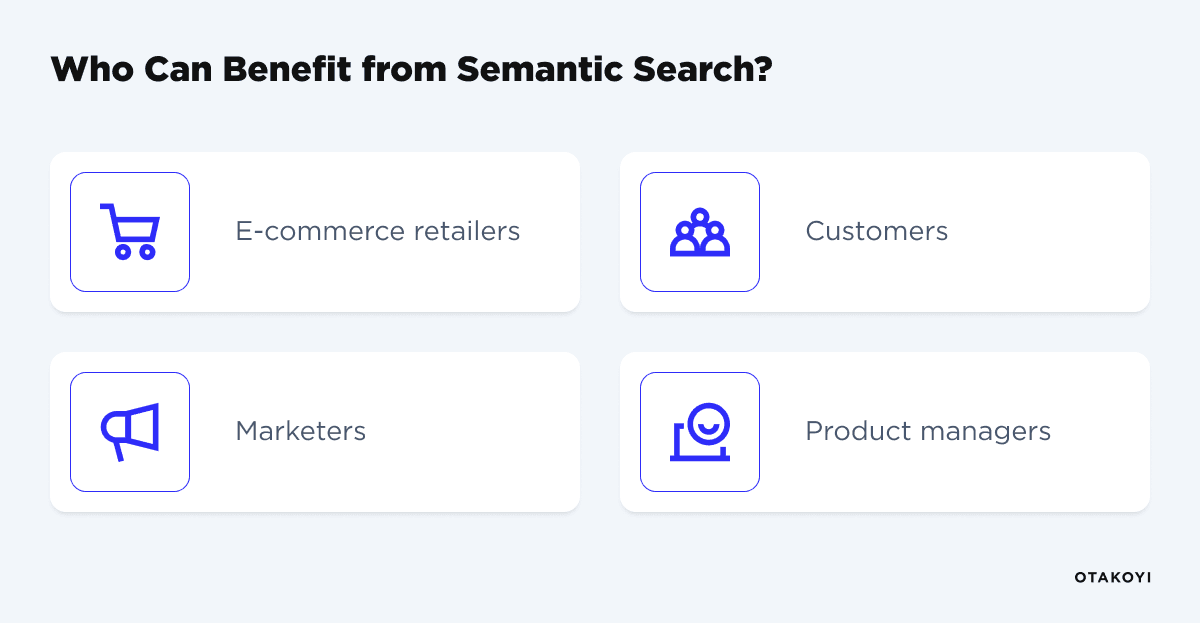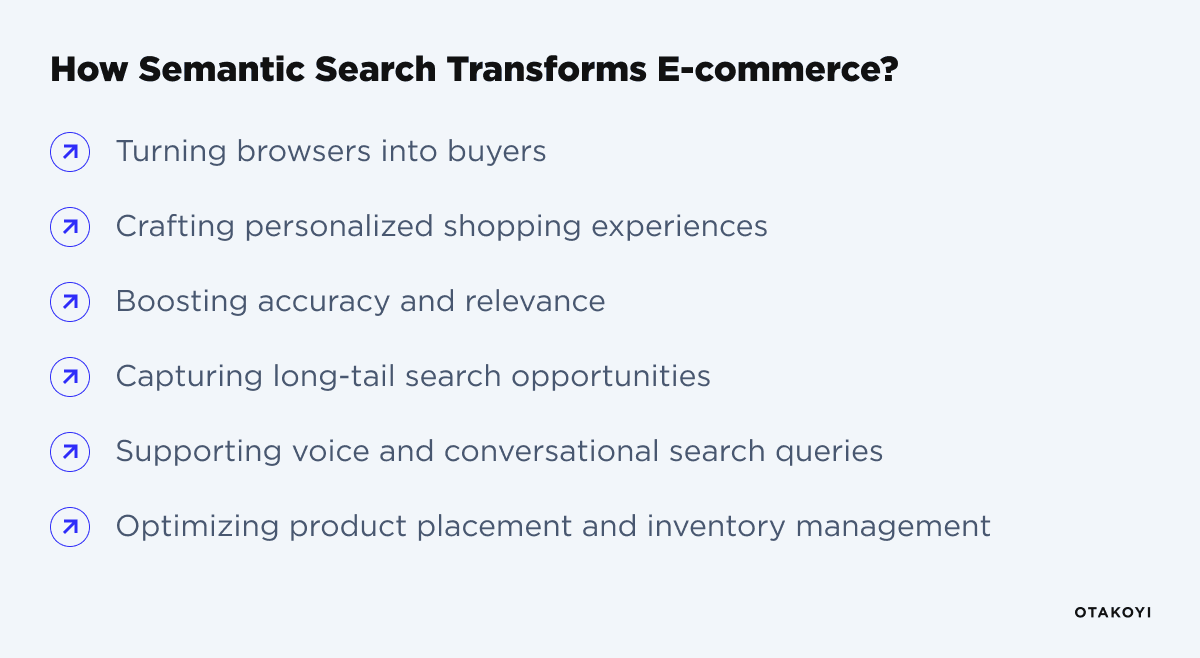Customer journey when doing online shopping is a top priority nowadays. eCommerce businesses should bear in mind that personalization is no longer a luxury. Actually, it's a must-have. So, what is semantics, and why is it so crucial for eCommerce? This concept is a branch of linguistics that studies the semantic meanings of words and their symbolic use, including their multiple meanings. You may start wondering, “So, what does it have to do with shopping?” Let us explain.
All the customers have their tailored experiences and unique preferences. There are many methods for how you can meet their needs. We are lucky to live during the era of Natural Language Processing, which really enhances semantic search for eCommerce. An amazing impact it has (and that’s basically the reason you should embrace this tool) is that it optimizes and improves the way how customers find products when visiting your online store. Are you ready to discover more? Let us accompany you into the world of semantic search and why it’s a game changer for eCommerce.
What Exactly Is Semantic Search?

Semantic search, which you should distinguish from traditional keyword searches, is fundamentally about understanding the meaning behind a search query. Simply put, semantic search considers the context and intent of the user's query rather than just matching words. Does it make sense? Linguistics can be ambiguous. Like, when someone says “Peter and Maria are married.” Are they married to each other? Or separately? Probably, it makes more sense for you now.
Let us give you more examples. When a user types in “best running shoes for women,” a conventional search engine may show results limited to pages with those exact words. However, when a semantic search engine comes into play, it digs further. It recognizes that the user is looking for options on premium running shoes made especially for females. As a result, shopping becomes more enjoyable with the help of semantic search for e-commerce businesses. It assists users in finding the products they really want by concentrating on search intent and context, not on the words.
Who Can Benefit from Semantic Search?
Answering the question of who can benefit the most from semantic search in e-commerce, we must say - everyone involved. Thinking how this, at first sight, minor advancement of the e-commerce journey can be so influential and impactful? Well, let’s find out how stakeholders can make the most of it.

#1 E-commerce retailers
Retailers have large product catalogs, which can create challenges for customers to sift through. That’s why semantic search enhances the shopping experience, as it provides more relevant results, reduces bounce rates, and ultimately increases conversion rates.
#2 Customers
This one we’ve already discussed. Of course, shoppers enjoy smooth and intuitive experiences. When they know that they can easily find what they want, it boosts customer satisfaction and encourages them to become your returning clients.
#3 Marketers
People behind the curtains! In fact, marketing specialists do benefit from this tool as they gain valuable insights into consumer behavior and preferences. As a result, they can come up with customized and efficient marketing strategies.
#4 Product managers
Product managers are the drivers of the process, as they should make decisions about inventory and product placement. When they can clearly understand what customers are searching for, it’s easier to make informed and working choices.
What Technology Makes Semantic Search Work?
As you have already discovered who benefits the most from semantic search in e-commerce, let’s find out what tech stack makes it work.
Advances in machine learning
Machine learning is the backbone of semantic search. Modern search algorithms learn from vast amounts of data through deep learning and identifying patterns in user behavior. This means e-commerce platforms can offer highly personalized results based on a shopper’s previous searches and interactions.
Recognizing named entities
Named entity recognition (NER) is another aspect that defines the development of improved shopping. This search technology identifies and categorizes important elements within a search query. For example, in the phrase “best hiking boots for women,” NER recognizes “hiking boots” as a product category and “women” as a demographic. This deep understanding enhances the search engine’s ability to deliver relevant results.
Understanding and modeling of topics
Understanding and modeling topics is a top-notch feature. By analyzing the relationships between different concepts, search engines can deliver results that are not just relevant but also contextually appropriate. So, if a user searches for “camping gear,” the search engine might suggest related items like tents, sleeping bags, or cooking equipment, enriching the shopping experience.
Why Semantic Search Is a Game Changer for E-commerce: Benefits It Brings
Having discovered for whom and how we have approached the most important part - why? We bet you’re ready to explore this topic further, so let’s proceed with revealing all the great benefits it brings.

Turning browsers into buyers
A lot of eCommerce owners know precisely who browsers are. How do you make them your customers? That is one of the biggest advantages of semantic search. When users can easily find what they’re looking for in a search bar, they’re more likely to make a purchase. This not only boosts sales but also enhances the overall customer experience.
Crafting personalized shopping experiences
Semantic search allows retailers to customize the shopping experience to match individual preferences. For example, if a customer frequently searches for eco-friendly products, the search engine can prioritize similar items, analyze the shopper's values, and build brand loyalty.
Boosting accuracy and relevance
With a focus on user intent, this advanced solution significantly boosts the search accuracy as well as the search relevance of results. This means shoppers encounter more relevant products, leading to less frustration and a more enjoyable shopping experience. Language models make sure customers return to the retailer over and over again to get the same level of accuracy.
Capturing long-tail search opportunities
Long-tail keywords (that is, longer, more specific search phrases) are often overlooked in traditional search strategies. Accurate search, which is semantic, excels at identifying and responding to these queries, allowing e-commerce businesses to tap into niche markets and attract a broader audience.
Supporting voice and conversational search queries
As voice search continues to gain traction, semantic search is becoming even more critical. It helps search engines understand natural language queries, accommodating how people speak rather than how they type. This shift to complex queries makes product discovery more seamless and user-friendly.
Optimizing product placement and inventory management
Insights from semantic search can inform product placement and inventory management. By semantic understanding of which products are frequently searched together or associated with specific queries, retailers can strategically position items on their sites to maximize visibility and sales.

Unlock the potential of personalized shopping!
Contact usHow Search Engines Leverage Semantic Search
As you have already realized, semantic search does improve accuracy and user satisfaction. Finally, let’s find out how it can be done.
Expanding search with synonyms
Semantic search doesn’t just rely on the exact same matches. In fact, it expands search capabilities by recognizing synonyms and related terms. For instance, searching for “sneakers” can also bring up results for “tennis shoes.” It gives users a better chance of finding what they need with the help of this semantic similarity.
Understanding relationships between entities
AI-powered semantic search tools deliver more relevant results by understanding the relationships between different entities. If a user searches for “smartphones,” the engine might suggest related accessories like cases or chargers, enhancing the shopping experience.
Enhancing local search with context
Semantic search really stands out in local search scenarios. By grasping the context of a query, like “restaurants near me,” search engines provide tailored recommendations based on the user's location. This approach makes it easier to find what they need.
Finding conceptually related results
How does it work? Basically, the search results present conceptually related results and ensure users discover products they may not have initially considered. For example, if someone searches for “winter jackets,” the search might also suggest “thermal layers” or “winter accessories,” broadening the product recommendations with such semantic matching.
Using semantic markups and rich snippets
We can’t help mentioning that retailers get a chance to enhance the search visibility of their online stores by implementing semantic markups and rich snippets. What are they? These tools help search engines better understand the content of a website. The results? It increases the likelihood of appearing in relevant search results and enhances click-through rates.
How to Implement Semantic Search in Your E-Commerce Store
Implementing semantic search doesn’t have to become a daunting task. When partnering up with an experienced team like OTAKOYI, you can leverage all the benefits it offers. Anyway, to make it clear to you, we will briefly explore the process of semantic search implementation.
#1 Choose the right technology
#2 Optimize product descriptions
#3 Use only structured data
#4 Analyze user behavior and feedback
#5 Test and iterate
These are easy steps on your way to transforming your eCommerce website and ensuring your customers will always come back to buy from you.
What’s Next to Expect for Semantic Search in E-commerce?
Looking ahead, the future of semantic search in e-commerce is bright. The technology is still evolving, and we should get ready for even more sophisticated search capabilities. Especially with advances in artificial intelligence and machine learning, semantic search can be a real game changer for the eCommerce industry in the future.
What can we expect?
- Even deeper personalization (would you like to feel your customers’ mood?)
- Voice shopping (imitating offline shopping, right?)
- Predictive product discovery (you get what you need even before you start typing)
- Improved image search opportunities (it definitely will not be limited just to words)
- Emotion-driven search (it’s like role-playing with a real shop assistant)
- Greater inclusivity in search results (diverse customers - diverse needs)
- Cross-language search (globalization is to the advantage)
- Hyperlocal shopping insights (geolocation technology is taking a stand)
Is the world ready for completely new online shopping adventures? Will see. As for now, don’t miss your chance to improve your competitive advantage with such a great solution as semantic search.





